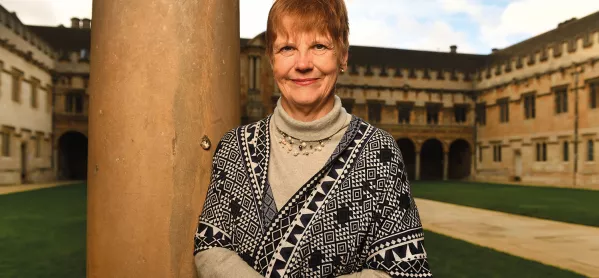- Home
- TES talks to...language difficulties expert Dorothy Bishop
TES talks to...language difficulties expert Dorothy Bishop

Her work has focused on one of the most common developmental disorders affecting children’s language and learning but, much to Dorothy Bishop’s frustration, very few people know what it is. “I would tell people what I worked on and no one had ever heard of it, which was ridiculous. This is quite a common developmental condition,” says Bishop, a professor of developmental neuropsychology at the University of Oxford.
Until recently, it was known as specific language impairment (SLI), and the term was used to describe children who struggled with language where there was often no other cause, such as deafness.
Studies show that two children in a typical class of 30 will be affected. In the classroom, they are likely to be the child who is quiet, doesn’t follow instructions or avoids starting classwork and homework. In discussions, they may be easily distracted, they may appear forgetful or they may respond unexpectedly to instructions.
Some students with these impairments look around and copy others’ actions or work when they don’t understand. They may also give explanations that are hard to understand, even if the speech sounds are clear, and might make mistakes with word order or tenses.
Verbal prompts
You can test for the condition. For example, a child might be asked to point to a set of pictures in response to verbal prompts. When told that “the ball on the table is blue”, a child with a disorder might persistently point to a blue table rather than the blue ball. Systematic patterns of mistakes like this can map out flaws in their understanding.
Why is so little known about it in schools? Disagreement about the criteria and terminology for the disorder have held back access to services, hampered diagnoses and hindered research. Bishop has been part of a team addressing that and, late last year, it was announced that SLI will be known as developmental language disorder (DLD), with a more consistent criteria, such as agreement that it can occur with other neurodevelopmental disorders.
What really hit me is how difficult language learning is
And Bishop says that this change in definition, along with an awareness campaign to support it, could lead to many more children being assessed for special needs.
“We knew it would be a bit unpopular because it might create floods of children looking for assessment,” she says.
That’s because the criteria don’t just recommend an assessment for children who evidently struggle with speech and language difficulties. They also recommend it for children with behavioural problems: Bishop says there is evidence that many of those children that struggle with behaviour have these hidden language difficulties.

“People sometimes think children are being wilful or disobedient, particularly when we see children who can talk quite fluently and don’t seem to have a language problem at all. But [they] struggle with understanding,” she says.
Different theories have been put forward to account for the difficulties in the past, from problems with perceiving specific language sounds to memory issues.
Bishop says that her focus now is on the system of language learning: the way we infer the rules of language from the patterns we hear as we grow up, often in an implicit way.
“You get a very strong sense of what’s right and what’s wrong, but no idea of what the rule is or if there is one,” she says. “What really hit me is how difficult learning language is: the really remarkable thing is how so many children do it so easily, without much instruction.”
A book extract that recently went viral on Twitter illustrates the point. Mark Forsyth in The Elements of Eloquence explains that every English speaker has absorbed a highly specific order for adjectives, almost certainly without knowing it: “opinion-size-age-shape-colour-origin-material-purpose noun”.
Try it. “A lovely little old rectangular green French silver whittling knife” sounds fine, if unwieldy; “green great dragons” is all wrong.
Researchers are interested in untangling how our brains do this kind of implicit learning, using our procedural memory system. “It’s the same system that we would use for learning things like motor skills, riding a bicycle or playing the piano,” Bishop says.
She explains that children who struggle with understanding language often seem to have similar problems detecting patterns in button-pressing sequences.
In a seemingly random sequence with repeating sections, most children speed up as they learn the pattern. But not children with language problems.
“When I started out and was going into schools, the general assumption was that these were children whose parents had not talked to them enough; they hadn’t had enough input,” Bishop says.
Parental interaction
A review by leading education consultant Professor Charles Desforges found that parents’ level of interaction with their children had a more significant impact on educational attainment up to age 11 than any other factor that education could influence.
But Bishop says that increasing parental involvement isn’t necessarily the solution.
“The difficulty that you have with that sort of study is that you’re not disentangling genes and environment, you are finding a correlation,” she says.
People with language difficulties will often raise children with language difficulties. But is it because interactions between the parent and the child are limited, or because the disorder is genetic?
Studies with non-identical twins raised together have been able to demonstrate that part of the difficulty is in the genes, when one twin develops significant problems and the other, raised in the same environment, is fine.
“I think a lot of parents feel a sense of relief that they’re not being blamed for their children’s difficulties,” she says. But teachers and therapists dislike genetic explanations, she finds: it leaves them feeling, wrongly, that there’s nothing they can do about it.
We have to be satisfied with tiny steps and incremental changes
In fact, when it comes to this disorder, helping parents to communicate better with children can still be worthwhile, Bishop says. “But I feel that sometimes people are very naive and they end up parent-blaming: ‘feckless parents not talking to their children’. I get really fed up with hearing that all the time,” she adds.
Among the few other interventions to show real promise is the Nuffield Early Language Intervention scheme, which has had a positive small trial conducted by the Education Endowment Foundation. It involves teaching assistants intensively focusing on the basics of vocabulary and language with children from the age of four to ensure that they can access the school curriculum.
“It’s not a quick fix,” Bishop warns. As a scientist, she regularly engages with teachers and the public on Twitter (where she has more than 20,000 followers) and on her blog, and she’s aware of the demand for solutions.
“It has made me keener to make my work more relevant to everyday things and not be too rarefied and theoretical,” she says. “What I do find very depressing about the state of education in Britain is the extent to which it still is the case that schools are putting a lot of money into things that aren’t evidence-based.”
Scientifically valid solutions are harder to come by than debunked fads such as Brain Gym, she says. Even then, the effects may be far from miracle cures, be it for SRI or anything else.
“We have to be satisfied with tiny steps and incremental changes,” says Bishop. “But that’s better than just flailing around in the dark.”
Joseph Lee is a freelance journalist. He tweets @josephlee
Keep reading for just £1 per month
You've reached your limit of free articles this month. Subscribe for £1 per month for three months and get:
- Unlimited access to all Tes magazine content
- Exclusive subscriber-only stories
- Award-winning email newsletters


